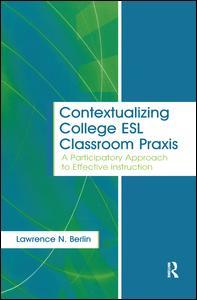Contextualizing College ESL Classroom Praxis A Participatory Approach to Effective Instruction Language, Culture, and Teaching Series
Auteur : Berlin Lawrence N.

Contextualizing College ESL Classroom Praxis: A Participatory Approach to Effective Instruction provides pre-service and in-service teachers with a model for engaging in effective instruction with the variety of students encountered in college English as a second language or foreign language classrooms. Along with the model, the text is designed to help readers develop the tools to use it within a participatory approach. This approach, based on the principles of Paulo Freire's critical pedagogy, is combined with multicultural education and the general tenets of a communicative approach to language teaching. From the philosophical to the theoretical to the practical, these strands are combined into a cohesive whole.
The underlying premise is that the best way to develop an understanding of a participatory approach is to engage in it. Throughout the book, readers are asked to apply problem-posing--a learning process that begins with naming issues, reflecting on them and possible solutions, and acting upon one's ideas. Questions addressed include:
*What is the nature of process over product?
*Is a new definition of effective instruction necessary?
*What are the factors that can affect second language acquisition?
*What do teachers believe about effective language instruction?
*What do students believe about effective language instruction?
*What makes pedagogy effective?
*How do teachers and students relate in the classroom?
*What does instruction mean for students?
*How can effective praxis be adapted to various contexts?
Each chapter includes Pre-Reading Questions, Post-Reading Questions, a topic for a Reflective Journal, and Follow-Up Activities. These provide opportunities to enhance comprehension of the material, to co-construct new knowledge with classmates, and to review personal beliefs and ideas in an effort to modify or reinforce them in one's own developing model for effective language instruction.
Contents: S. Nieto, Foreword. Preface. What Is the Nature of Process Over Product? Is a New Definition of Effective Instruction Necessary? What Are the Factors That Can Affect Second Language Acquisition? What Do Teachers Believe About Effective Language Instruction? What Do Students Believe About Effective Language Instruction? What Makes Pedagogy Effective? (The Pedagogical Function) How Do Teachers and Students Relate in the Classroom? (The Environmental Function) What Does Instruction Mean for Students? (The Societal Function) A Brief Review. (The Effective Instruction Model) How Can Effective Praxis Be Adapted to Various Contexts? (The Application Model)
Date de parution : 06-2017
15.2x22.9 cm
Date de parution : 05-2005
Ouvrage de 192 p.
15.2x22.9 cm
Thème de Contextualizing College ESL Classroom Praxis :
Mots-clés :
Effective Language Instruction; Global Learning Style; effective; ESL Classroom; language; Effective Praxis; instruction; Individual Learner Differences; teacher; Follow; participatory; Effective Language; approach; ESL Instruction; learning; ESL Class; languages; Language Teaching; individual; Participatory Approach; learner; ESL Teacher; Effective Language Instructors; Effective Model; Societal Function; Multicultural Classroom; United Arab Emirates; Environmental Function; Critical Pedagogy; Language Learning; Application Model; Naturalistic Paradigm; Fit; Language Orientations; Language Acquisition



